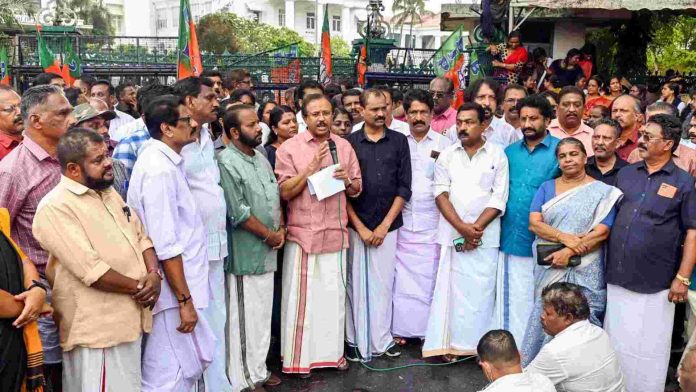Kochi (Kerala), November 24 – As the Waqf (Amendment) Bill, 2024, is set for discussion during the winter session of Parliament starting Monday, residents of Kochi’s Munambam community have intensified their protest against the Waqf Act, citing hardships caused by the legislation.
Protesters, who have been demonstrating for 33 days, claim that despite purchasing property between 1988 and 1993 and residing in the area for over 150 years, the Waqf Board has now asserted ownership of their land. The community is demanding amendments to the Waqf Act to safeguard their rights and reclaim their property.
Protestors Call for Change
Speaking to ANI, one of the protesters explained the non-violent nature of their demonstration, emphasizing that their grievance is with the Act, not any religion.
"We are on the 33rd day of our protest and this is a fasting protest following the method of non-violence. Today, we brought an effigy of the Waqf Act. We are not against any particular religion; we are only against the Waqf Act, which has to be amended... We need to amend the laws because we have to address certain issues which are deeply rooted in today's India," he said.
The Munambam community voiced their frustration over the Waqf Board’s actions, claiming that the 1995 Act allowed the Board to claim ownership of their property decades after it was purchased.
"These fishermen have been living in this place for the last 150 years. They bought this property in 1988-1993. After 35 years of possessing this property, today they are asked to leave because the Waqf Board has entered this property into their registration. We expect that the Government will notice all these things and make the necessary changes to change the Waqf Act and enable us to reclaim this property," added the protester.
The Waqf (Amendment) Bill, 2024
The Waqf (Amendment) Bill, listed for consideration in the winter session, seeks to introduce sweeping reforms to the existing 1995 Act, which has been criticized for alleged mismanagement, corruption, and encroachments. Key provisions in the amendment include:
- Digitisation of Waqf property records.
- Stricter audits for transparency.
- Legal mechanisms to reclaim illegally occupied properties.
The Bill is being examined by a Joint Parliamentary Committee (JPC), which has conducted 25 meetings since August 22, reviewed the work of six ministries, and heard from 123 stakeholders, including Waqf Boards and minority commissions. The JPC is expected to submit its report during the winter session. However, opposition members have called for an extension to ensure a thorough review.
Winter Session Overview
The winter session of Parliament will begin on November 25 and continue until December 20, with 19 sittings scheduled. The session will address 16 bills, including the Waqf (Amendment) Bill, amid growing public interest in the reforms it proposes.
Background and Allegations
Enacted in 1995, the Waqf Act was designed to regulate Waqf properties but has faced accusations of:
- Mismanagement and lack of accountability.
- Corruption within Waqf Boards.
- Widespread encroachments on Waqf properties.
The Munambam community’s protest underscores growing discontent among citizens over perceived injustices stemming from the existing Act.


